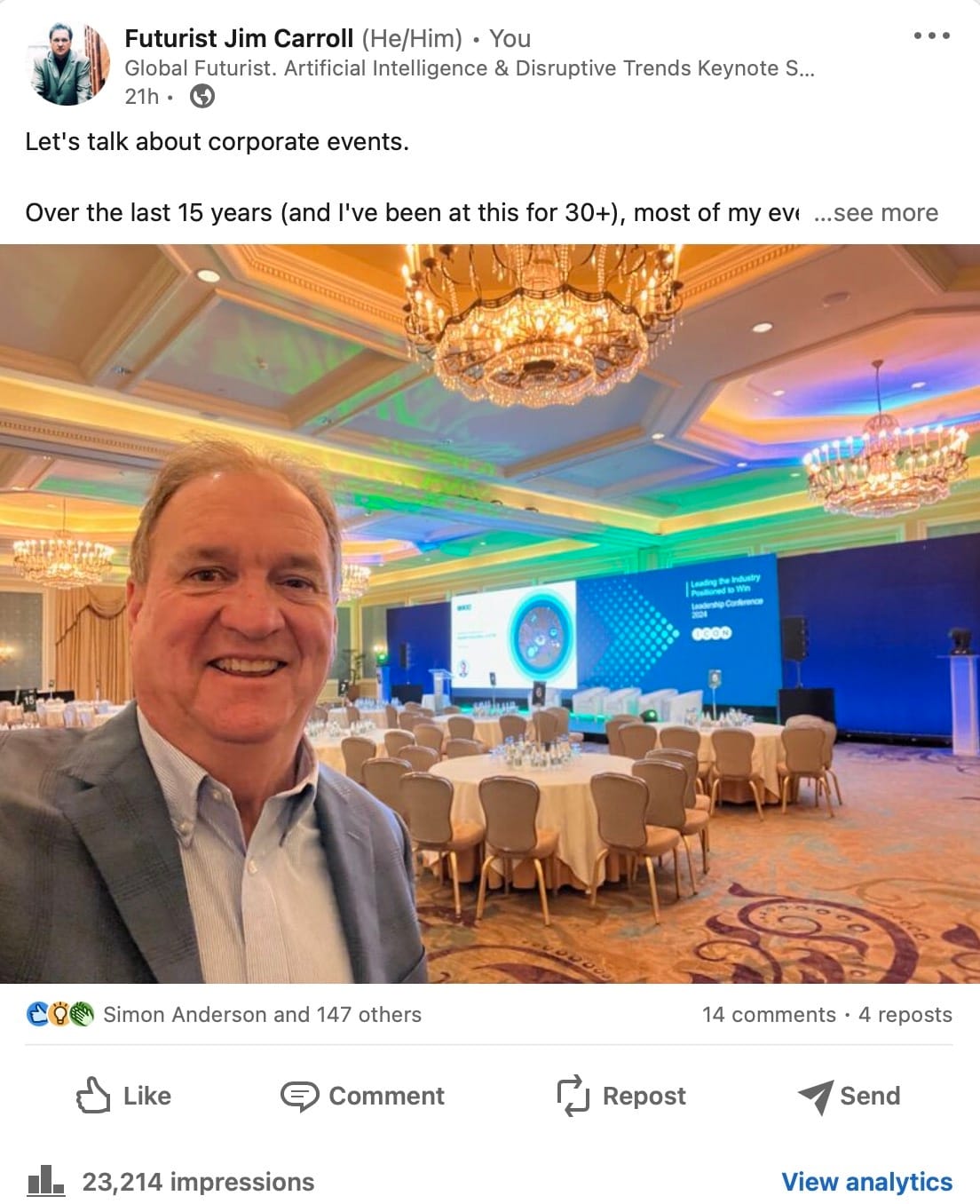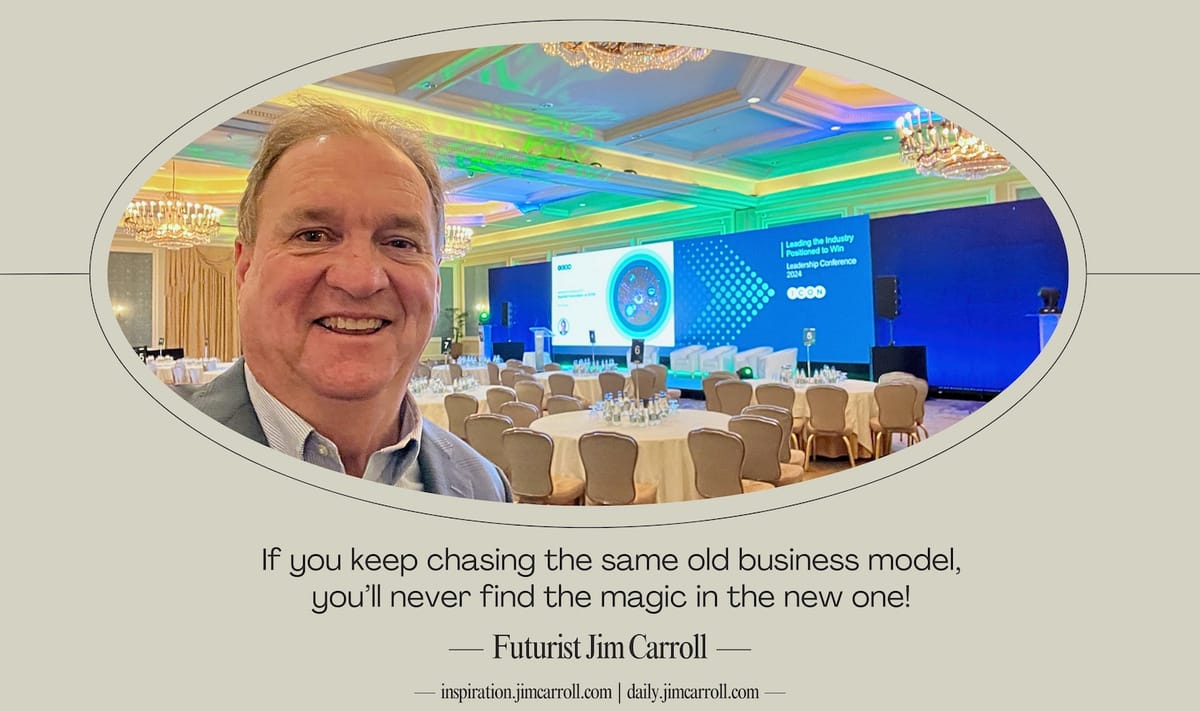"If you keep chasing the same old business model, you’ll never find the magic in the new one!" - Futurist Jim Carroll
I had a post the other day over on a LinkedIn group that has drawn quite a bit of interest; at the moment I write this, it's approaching 24,000 views. That's pretty significant.

My post was to the 'Skift Meetings Event Professionals Community" - essentially, it's a community where the folks who organize the world of corporate, association, trade shows, conferences, and conventions hang out, seeking tips, sharing ideas, and offering up answers to questions posed by others. It's a pretty active group, drawing interest from around the world from meeting planners, trade show experts, speakers bureaus, speakers, staging and AV companies, and more.
My post - reproduced in its entirety below - had to do with something that has been very much on my mind as of late - and that is that this industry is changing in a significant way. There is a pretty significant shift in spending, a change in the individuals responsible for organizing an event, as well as the speed and purpose for which these events are being pulled together. Opportunity is to be found by aligning to and adapting to this trend, instead of simply staying focused on the old business model that has been in place for many years.
What is that business model? In the 'olden days' - say, anywhere up to about 2010 or 2015 or so, most major events were held by associations through their annual meetings, conferences, trade shows, and events. Planning cycles were slow and deliberate, often with a year's lead time or more. Budgets were rich - many event managers would approach a speakers bureau to find a high-profile celebrity or two to draw attendance and attention to the event. The events were pretty formulaic - in addition to the high-profile keynote, several event tracks were organized, often with speakers focused on the hot topic of the day.
The industry worked according to a pretty established format - and many of my events fit into that mold. It seemed that many people were operating on autopilot. But things seem to be changing - association budgets are down, and many are struggling to fund the same type of lavish events they have in the past, as membership and attendance challenges become the norm.
On the flip side, the number of very short-term corporate events is on the rise, as is the spending attributed to such events. Major corporate organizations are encountering fast emerging trends faster, and find it necessary to pull together their team in a hurry for an elaborate - and focused - offsite meeting. Trade show spending is down as more organizations discover the power to be found in bringing key clients and customers to an offsite location for a couple of days. The urgency of change is driving faster decisions on topics - they don't need a celebrity kickoff, but rather, deep topic insight.
My post was trying to get across the scope and urgency of this change, knowing that many event professionals might still be stuck in the old way of doing things, and might not be seeing the real opportunities in this fast-emerging and growing market. Speakers bureaus and their agents might be caught in the same trap. I sense that many are caught up in thinking about the old way of doing things, and not paying enough attention to this new emerging trend.
But I know I am - it's become very much the core of my business, with this photo in front of my stage for my event last week in Dublin. Old business models change. New ones emerge. You must always keep chasing the new one - because opportunity is at the end of the rainbow of initiative.
Let's talk about corporate events.
Over the last 15 years (and I've been at this for 30+), most of my events are skewing to large-scale corporate CEO-level events - top leadership team meetings of 100-200+ people. I just came back from such an event for a global pharma company in Dublin.
Here are 10 trends defining this space that you might not be thinking about as an event planner.
1. Meetings are happening faster. I laughed 10 years ago when my booking cycles were down to 6 months. They might now happen in as little as 2 months or less. Why? See #2
2. Disruptive trends are disrupting faster. Organizations now need to confront new emerging issues faster. An issue might pop up and require an all-hands meeting or event in a short period because the impact of not confronting the issue is real.
3. Bigger budgets are in place. In the 'olden days,' these meetings would have a riser, a podium, and a mic. The last 5 years have seen big companies investing big bucks for big staging, with LED walls and more. You know that many associations don't have a budget anymore. Big corporate groups do.
4. An event planner is often not involved. The meeting owner is often a senior VP or similar who is charged with pulling together a meeting. They are flying blind; I find that many of them didn't know the organization has an event planner - if they even have one! This is an untapped big opportunity for external partners.
5. The topic is very narrow. The future of construction with AI. The impact of accelerated pharmacogenetics with AI on the design of clinical trials. The a need to invest in 3d printing and digital twin technology for the manufacturing process. These are all topics that I've taken on for big corporate groups - they are looking for in-depth insight on some fast new complex topics.
6. The sessions are intense. They aren't just there to mingle and greet and learn to build a collaborative team (though that is important). There are big goals for big takeaways with big, real strategies. The agendas I've seen are packed to the rafters with little downtime. They need to accomplish something - this is not just a 'feel-good get-together.'
7. It's NOT about 'experiences.' Given their strategic focus, they're not into 'experience' - it's all about the content. They're not caught up in all the event industry drama about the fact that millennials don't have attention spans & and need to be entertained - because often, those millennials are under-represented at the event.
8. It's a broad audience. Legal, marketing, sales, senior execs. Everyone is represented.
9. They often don't know about speaker bureaus. Hello, Google! My bookings come from people finding me directly via search engines, word of mouth, and direct connections. Often, the very people booking me have no clue about the world of speakers bureaus.
10. They're growing. I am seeing a dramatic uptick in these events. It's a growth spot.
It's my niche. https://ceo.jimcarroll.com
Futurist Jim Carroll has been working within the events industry for 33 years. He's seen a lot of change and has adapted continuously along the way. Reinvention is his middle name.

